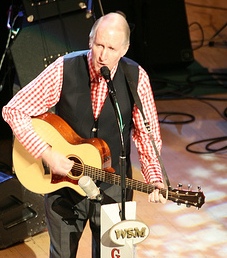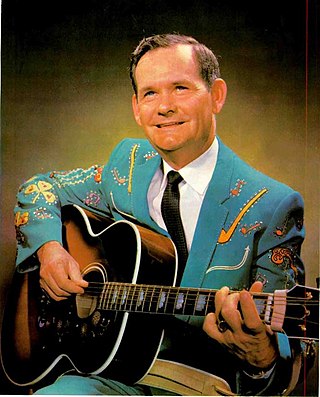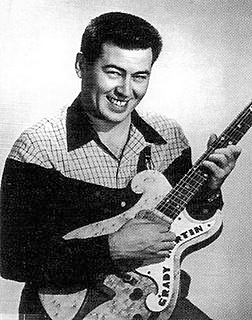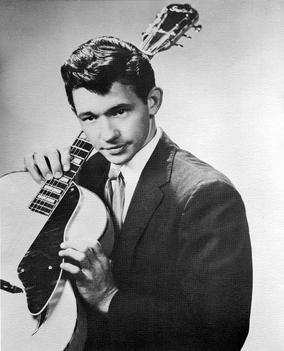Related Research Articles

George Hege Hamilton IV was an American country musician. He began performing in the late 1950s as a teen idol, switching to country music in the early 1960s.

Roy Claxton Acuff was an American country music singer, fiddler, and promoter. Known as the "King of Country Music", Acuff is often credited with moving the genre from its early string band and "hoedown" format to the singer-based format that helped make it internationally successful. In 1952, Hank Williams told Ralph Gleason, "He's the biggest singer this music ever knew. You booked him and you didn't worry about crowds. For drawing power in the South, it was Roy Acuff, then God."
Ozark Jubilee is a 1950s American television program that featured country music's top stars of the day. It was produced in Springfield, Missouri. The weekly live stage show premiered on ABC-TV on January 22, 1955, was renamed Country Music Jubilee on July 6, 1957, and was finally named Jubilee USA on August 2, 1958. Originating "from the heart of the Ozarks", the Saturday night variety series helped popularize country music in America's cities and suburbs, drawing more than nine million viewers. The ABC Radio version was heard by millions more starting in August 1954.

Porter Wayne Wagoner was an American country music singer known for his flashy Nudie and Manuel suits and blond pompadour.

James Cecil Dickens, better known by his stage name Little Jimmy Dickens, was an American country music singer and songwriter famous for his humorous novelty songs, his small size, and his rhinestone-studded outfits. He started as a member of the Grand Ole Opry in 1948 and was inducted into the Country Music Hall of Fame in 1983. Before his death he was the oldest living member of the Grand Ole Opry.

Lawrence Hankins Locklin was an American country music singer-songwriter. He had 70 chart singles, including two number one hits on Billboard's country chart. His biggest hits included "Send Me the Pillow You Dream On" and his signature "Please Help Me, I'm Falling". The latter also went to number eight on the Billboard Hot 100 pop music chart. Billboard's 100th anniversary issue listed it as the second most successful country single of the rock and roll era. It sold over one million copies, and was awarded a gold disc by the RIAA.
Knowles Fred Rose was an American musician, Hall of Fame songwriter, and music publishing executive.

Clyde Julian "Red" Foley was an American musician who made a major contribution to the growth of country music after World War II.

William Marvin Walker was an American country music singer and guitarist best known for his 1962 hit, "Charlie's Shoes". Nicknamed The Tall Texan, Walker had more than 30 charting records during a nearly 60-year career, and was a longtime member of the Grand Ole Opry.

Lloyd Estel Copas, known by his stage name Cowboy Copas, was an American country music singer. He was popular from the 1940s until his death in the 1963 plane crash that also killed country stars Patsy Cline and Hawkshaw Hawkins. Copas was a member of the Grand Ole Opry.

Harold Franklin "Hawkshaw" Hawkins was an American country music singer popular from the 1950s into the early 1960s. He was known for his rich, smooth vocals and music drawn from blues, boogie and honky tonk. At 6 feet 5 inches (1.96 m) tall, Hawkins had an imposing stage presence, and he dressed more conservatively than some other male country singers. Hawkins died in the 1963 plane crash that also killed country stars Patsy Cline and Cowboy Copas. He was a member of the Grand Ole Opry and was married to country star Jean Shepard.

Thomas Grady Martin was an American session guitarist in country music and rockabilly.
Ernest Earl "Jimmy" Walker was an American country musician.
Harold Bradley "Shot" Jackson was an American country guitarist best known for playing Dobro and pedal steel guitar. He also designed and manufactured guitars under the name Sho-Bud.

Beecher Ray "Pete" Kirby, better known as Bashful Brother Oswald, was an American country musician who popularized the use of the resonator guitar and Dobro. He played with Roy Acuff's Smoky Mountain Boys and was a member of the Grand Ole Opry.

Robert Lester Lord was an American country music singer-songwriter popular in the 1950s and 1960s.

Herschel Haworth Jr., better known as Speedy Haworth, was an American guitarist and singer who was involved with the golden age of country music broadcasting in the Ozarks. He was a featured cast member of ABC-TV's Ozark Jubilee from 1955–1960 and is a member of the Missouri Country Music Hall of Fame.
Howdy Forrester, born Howard Wilson Forrester, was an American bluegrass fiddler and a popularizer and practiser of the "Texas" or "show fiddle" style. He was a long-time member of Roy Acuff's Smoky Mountain Boys.
June Webb is an American former country music singer-songwriter notable for the song "Looking Glass". She rose to fame in the early 1950s, and had a 11-year career in the country music industry.
References
- 1 2 3 4 5 6 Colin Larkin, ed. (2002). The Virgin Encyclopedia of Fifties Music (Third ed.). Virgin Books. pp. 488/9. ISBN 1-85227-937-0.
- ↑ "ONIE WHEELER". Rockabilly.nl. Retrieved October 29, 2019.